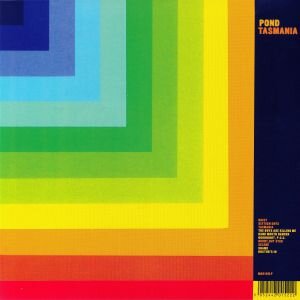Album Review: Avey Tare - Cows On Hourglass Pond
/Send a member of Animal Collective on tour and you’re bound to get an album’s worth of new material out of it. They’re one of the finest bands to operate in that off-the-cuff, emotional level this side of The Grateful Dead. What places them so high on this list involves more than “jamming” on stage and recording the next session. The songwriting and form goes through a metamorphosis as well. With Avey Tare, one quarter of the band and its principal songwriter, this is exceptionally true.
The songs on Cows on Hourglass Pond spent enough time in the 2017 Eucalyptus tour incubator and are surprisingly different despite being less than two years removed. Borrowing from each era of Tare’s solo work, the songs here are a grab bag of rich two-chord structures, slowed-down trance beats, samples, and a defeated, witful vocal. This last part, the vocal, is the biggest element separating the old Tare from the new. Some new musical tricks would have been a welcome addition.
‘Saturdays (Again)’ is a particularly sad outing. Tare skates on thin ice with an ocean of melancholy just below the surface. In the video for the single, he leads a cow across a psychedelic pasture as a metaphor for the emotional weight of his past. The songs best traits are its breezy quality and jazzy drums, simultaneously moving fast and slow. “My how time flies” mentions his younger cousin in the verse, and Tare can’t help but consider what it means to have someone younger than you comment on the chaotic passage of time.
Tare has always had an infatuation with the father time and how we try to maintain our childishness. “Do the elderly couples still kiss and hug?” he asked on Animal Collective’s 2005 disc Feels, but the excitement for growing older showcased there has been replaced with a middle-aged exhaustion throughout much of Hourglass Pond and ‘Saturdays (Again)’ in particular. ‘Chilly Blue’ is the perfect instrumental follow-up, and serves as a great way to forget the past and stop worrying about the future. Still, “Saturdays” lives partly in the present and partly in the past, all while trying to accept how Mondays aren’t very well suited for good times and fond memories.
Memory plays an enormous role throughout the record. ‘Eyes on Eyes’ meditates on eye contact and close relationships, both of which he longs for: “All the eyes I could’ve seen/and yours came beaming/I can’t look back/I’m changed in you.” This track is the most vocally buoyant and fun on the whole record. Trace your finger in the air to the melodies and your hand will do quite a dance. This playfulness is largely absent Hourglass Pond’s back half, where the mix of acoustic and sample-based music turns dull. ‘Our Little Chapter’ is a blatant underutilization of one of the most charismatic voices in indie rock. We know from Tare’s past records that he can turn sadness into bliss ( 2010’s Down There) and psychedelia into pure ecstacy (2007’s Strawberry Jam). The weaker moments here are right on the nose, and lack the emotional resonance we need from Tare.
‘What’s the Goodside?’ however perfectly strikes this balance between new and old Avey. Complex musings on aging (“Babies are for milking”) overlay minimal acoustic guitars and blend into a bath of downtempo bliss. Tare’s vocal is beautifully warped and twisted, adding a bleak piece of humanity to the tracks hypnotic meter.
Many of the elements that work on Hourglass Pond are present throughout the record, they just fail to make as deep an etching on the soul as other members of Tare’s enormous catalogue. Like his bandmate Panda Bear, whose new album Buoys has all the right ingredients, Tare juggles between using the production towards his advantage and half-baking the tunes. This is frustrating when considering how damn well a lot of the songs work here. ‘Taken Boy’ features the best songwriting on the album as Tare questions how people can live in a constant state of anticipation, but the vocal performance doesn’t have the bombast to match. ‘Nostalgia in Lemonade,’ on the other hand, has an exceptional delivery, but only feels half-finished in the wake of ‘Saturdays (Again).’.
Hourglass Pond is an off-balance album. If you played the album to someone who didn’t know Tare had a new album, it would be very unclear where it belongs in his discography. Eucalyptus was a folk record, and it operated well within that paradigm. Containing numerous elements from Tare’s career, Hourglass Pond has a bit of an identity crisis. Like recent years where Animal Collective have returned to acoustic instruments and the improvisation that helped give them their name, this record flashes a fine combination of experimental pop and folk, but it’s merely a flash. If these songs were all written on the stage during Avey’s last tour, maybe some of them need to get back up there for some more workshopping. As it were, Avey Tare is on tour, and we can find out for ourselves. I’d recommend that over diving too deep into the hourglass pond.





